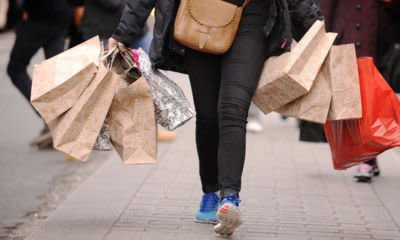Retail sales slip back in September as prices rise

Retail sales went into reverse last month as prices rose in a sign of uncertain consumer demand ahead of a possible interest rate rise.
Official figures showed sales volumes dropped by a worse-than-expected 0.8% in September, meaning year-on-year growth for the third quarter was the weakest since 2013.
It was the first monthly fall since May and fuelled speculation that a bounce seen over the summer may have been boosted by the weakness of the pound encouraging more tourists to come to Britain and fewer Britons to go on holiday abroad.
The pound slipped by a cent to nearly $1.31 as traders digested the implications for interest rates amid expectations that the Bank of England could lift the cost of borrowing next month.
Rate-setters face a dilemma over whether to go for the hike for the first time in a decade as inflation reaches a five-year high , or hold back amid sluggish economic growth.
Households have already been squeezed by six months in a row of below-inflation pay rises and the fear of some experts is that demand could be knocked further by a rate rise.
September's retail sales data from the Office for National Statistics (ONS) reversed growth of 0.9% seen in August.
But ONS senior statistician Kate Davies said there had been a continuation of an underlying trend of steady growth in sales volumes, following a weak start to the year.
She (Munich: SOQ.MU - news) added that there was a background of generally rising prices, reflected in the stronger growth for the amount spent in the retail sector compared to the quantity bought.
James Smith, economist at ING Bank, said the Bank of England still looked likely to raise interest rates from 0.25% in November but a second hike in the following months was less assured.
Samuel Tombs, chief UK economist at Pantheon Macroeconomics, said: "The slump in retail sales in September was driven by retailers implementing large price rises."
Ian Geddes, head of retail at Deloitte, said: "An interest rate rise could cause an additional headache for retailers in the lead up to Christmas."
Howard Archer, chief economic advisor to the EY ITEM Club, said: "September's relapse fuels suspicion that August's marked gain in sales had been buoyed by tourists being encouraged to spend by the weakened pound and by more people staying at home for the summer holidays."

 Yahoo News
Yahoo News 